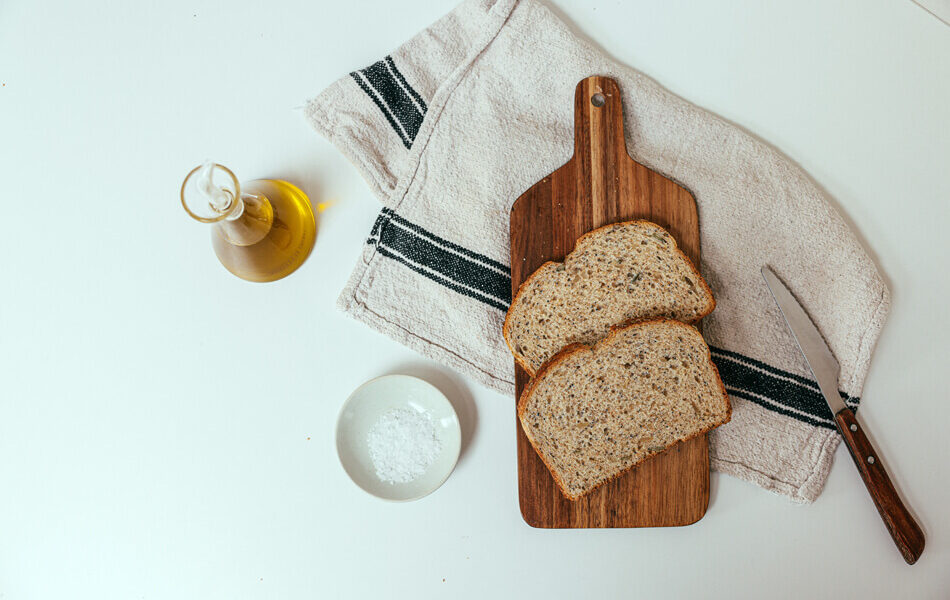Is Wheat Bread Good for Weight Loss? Here’s Everything You Need to Know
If you want to lose weight, you probably already have a plan. Does it include wheat bread, or should you avoid bread completely when trying to shed a few pounds? Our experts explain.

For quite some time, dieters around the world have been sure that wheat bread is way better than white one because wheat bread is higher in fiber and has a dense amount of such nutrients as selenium, manganese, niacin, riboflavin, and others.
Do you still think eating a few slices of wheat bread every day might be beneficial for your weight loss process? Our nutritionist explains the link between whole grains and weight loss.
Is Wheat Bread Good for Weight Loss?
Wheat bread is not the best option for your diet as it is high in carbohydrates and low in healthy fats. However, this type of bread won’t make you gain weight if you are going to stay in a calorie deficit.
If you like to eat bread, you should be careful about the amount you consume and the type if you want to lose weight and be healthy. When possible, opt for whole-grain or rye bread instead of whole-wheat, white, or anything-other bread. These types of bread have less refined carbohydrates and are therefore easier to digest.
They’re also full of fiber, so you’re more likely to feel fuller than with other types of bread. Whole-grain bread also contains more proteins and minerals, being a lot healthier for your diet, and you’re also less likely to have reactions from it.
Wheat Bread Nutrition Facts
Wheat bread is slightly different from white bread as whole-wheat bread contains more fiber and protein; therefore, you feel fuller for longer. You should completely avoid eating this bread if you are following the keto diet, as even a slice of bread will kick you out of ketosis.
| Net Carbs | Total Carbs | Fats | Protein |
| 43.5g | 47.5g | 4.53g | 10.7g |
| Calories | Fiber | Sugar | Glycemic Index |
| 274 | 4g | 5.73g | 70 |
Is Bread Bad for You?
Eating bread can be questionable, as some types can be good and others bad for your body. Again, it really depends on what your dietary goal is. If you want to eat food to lose weight, whole-grain bread, white bread, or just eating any type of bread can be bad for you if you don’t have a balanced diet in place.
Eating multiple wheat bread slices a day could easily cause weight gain. This is especially evident in white and whole-grain bread, as it’s known to have a high glycemic index of almost 70.
Research shows that high glycemic foods are bad for weight loss and fat oxidation, whereas low glycemic foods help aid it. Therefore, if you don’t eat bread wisely or in moderation, bread can be bad for losing belly fat.
What Does Bread Do to Your Body? 3 Side Effects You Should Be Aware of
If you eat bread only once in a while, you probably won’t feel any unpleasant effects, but if wheat bread is a big part of your diet, be aware that it can be the cause of bloating, constipation, or other gut-related problems.
#1 Blood sugar spikes
As mentioned earlier, bread is known to have a high glycemic index, as the carbohydrates in each slice are refined.
Refined carbohydrates trigger your body to digest them easily and quickly, causing your pancreas to work harder to produce insulin, causing a surge in your blood sugar levels.
#2 You may end up feeling hungrier
Most of the bread contains white flour. This flour has been processed, so there’s no bran inside; therefore, there is less dietary fiber in the bread. Dietary fiber keeps you fuller for longer and is beneficial for your digestive system.
Moreover, bread’s high glycemic index means you will get a surge of energy and then crash, making you want to compensate for your energy by eating more food.
#3 Possible bloating and constipation
Whole-wheat bread contains a protein known as gluten. In some people, gluten can increase stomach issues such as gas, bloating, pain, and diarrhea.
Sometimes, too much gluten can lead to celiac disease. Research suggests that those who eat less gluten in their diet may suffer less from problems associated with bowel movements such as constipation and bloating.
FAQs
Bread on its own will not make you gain weight. It’s more about how many calories you consume from food. If you’re eating more calories than you burn, then bread could contribute to your weight gain.
While bread is not the ideal food when trying to lose weight, rye bread would be the best option. Research shows that rye bed helps with weight loss, and it’s believed to be because of its high fiber content.
You should not consume more than 6 slices of bread per day. However, when possible, balance the bread in your diet with other types of carbohydrates.
Conclusion
Wheat bread is not the best choice for your toast if you are trying to lose weight. This type of bread contains a lot of carbohydrates that can cause your blood sugar to spike, make you feel more bloated, and trigger possible bowel issues. This is partly because wheat bread contains refined flour, which is processed, removing the natural nutrients your body needs.
If you can’t give up bread in your diet fully, you should aim to eat it in moderation and opt for whole grains instead of refined carbs. Remember to switch up your bread with other carbohydrates like non-starchy vegetables, fruits, and nuts.

















































 Select your language:
Select your language: 








